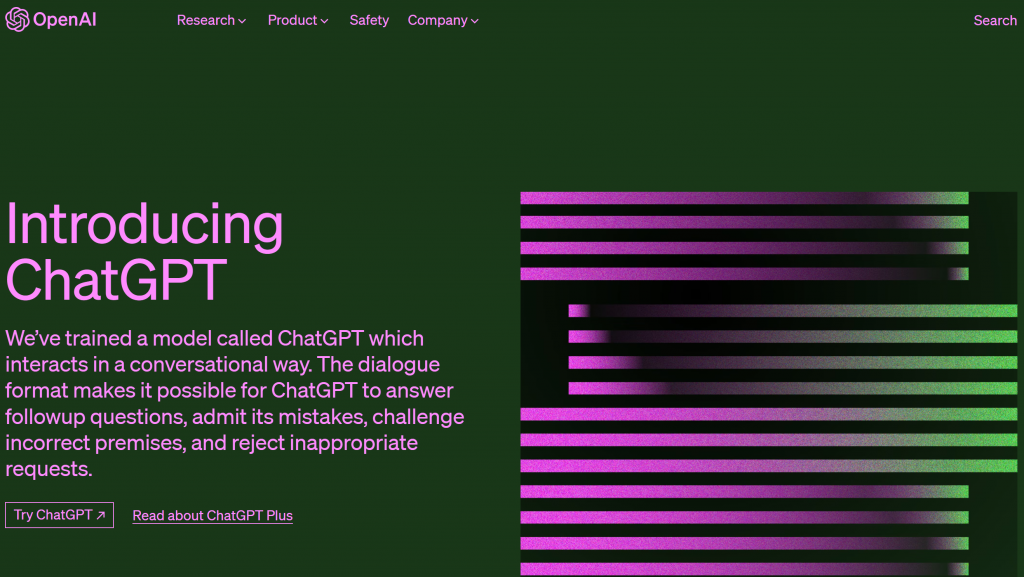There’s no denying that automated content producers like ChatGPT have caused some concern among content writers and marketers. Not least regarding its suitability for website copywriting and search engine optimisation (SEO) purposes.
And now Google has said that using AI for the copy on your site won’t necessarily mean a downgrade in your SEO ratings, as some had feared – but there is a twist.
The twist is that Google still expects AI-produced content to demonstrate E-E-A-T (expertise, experience, authoritativeness and trustworthiness).
You still have to provide value to the reader
In the spirit of E-E-A-T, Google says it will reward content that meets those criteria, regardless of who (or what) produced it. So, you can go ahead and get your new idea from Chat GPT, or even ask it to write something that serves as a framework for your next article, but you have to make sure it demonstrates your expertise, experience, authoritativeness and trustworthiness.
Otherwise, you’re wasting your resources and you could still see your site penalised in Search.
“When it comes to automatically generated content, our guidance has been consistent for years. Using automation—including AI—to generate content with the primary purpose of manipulating ranking in search results is a violation of our spam policies.”
Despite the strong sentiment from the quote above, it should be noted that Google goes on to say that “not all AI generation is spam”. AI has been used to create helpful, authoritative content for years – including sports scores, weather forecasts and transcripts.
Google claims that “AI has the ability to power new levels of expression and creativity, and to serve as a critical tool to help people create great content for the web.”
Automation can help create good content
All of this means that Google will allow AI-generated content to be ranked in its Search results, as long as it’s not full of spam and is of little value to the reader. It says its SpamBrain system will continue, and that it’s important to use new tools to help creators connect with their audience in new ways.
Google’s advice for creators considering AI-generation
If the E-E-A-T concept is new to you, head here to familiarise yourself with it. In a nutshell, you need to create content that’s primarily for people, not to manipulate search engine rankings.
Google says that to understand if your content is ‘people-first’, you should ask yourself questions such as:
- After reading your content, will someone leave feeling they’ve learned enough about a topic to help achieve their goal?
- Will someone reading your content leave feeling like they’ve had a satisfying experience?
FAQs
Google has published a helpful list of FAQs regarding AI and Search, which we’ve summarised below.
Is AI content against Google Search’s guidelines?
No, as long as it’s not used to manipulate search rankings.
Why doesn’t Google Search ban AI content?
Because AI-generated content can be helpful, creative and exciting.
How will Google Search prevent poor-quality AI content from taking over search results?
There are existing systems in place to detect poor-quality content and ensure it doesn’t dominate search results. Whether the content is produced by AI or humans makes no difference.
How will Google address AI content that potentially propagates misinformation or contradicts consensus on important topics?
In the same vein as the question above, these issues also exist in human-generated content. Google’s systems will work to combat misinformation regardless of who or what produces it.
How can Search determine if AI is being used to spam search results?
In a very short answer, yes.
Will AI content rank highly on Search?
As long as it’s useful and meets E-E-A-T requirements, then it will. The same as any other piece of content would.
Should I use AI to generate content?
Maybe, as long as the content is helpful and original. Don’t use it to manipulate search engine results.
Should I add author bylines to all my content?
Bylines are good as they tell the reader who wrote it. If you want to appear in Google News, bylines and author information is a must.
Should I add AI or automation disclosures to my content?
You should consider adding these “when it would be reasonably expected.”
Can I list AI as the author of content?
Giving AI a byline isn’t the best way to make it clear to the reader that the copy wasn’t human-generated. Consider being clearer that AI was part of the content creation process.




RECOMMENDED FOR YOU
Google Rebuilds Checkout For AI Shopping
Agentic shopping has moved from theory to reality, and…
Agentic shopping has moved from theory to reality, and…
Google AI To Power Apple’s Siri
Apple has officially teamed up with Google in a…
Apple has officially teamed up with Google in a…
Google’s Nano Banana AI App Fuels Growth
Google’s latest AI success story is not a productivity…
Google’s latest AI success story is not a productivity…